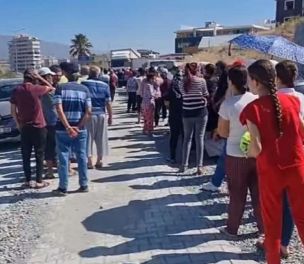Click to read the article in Turkish
More than two months have passed since the catastrophic earthquakes in Maraş, which killed over 50,000 and injured over 100,000 people in 11 provinces. The situation for the four million children registered in the disaster area remains precarious, a report prepared by Ekmek ve Gül (Bread and Roses) reveals.
The region has faced significant challenges in reaching and ensuring the safety of missing or unaccompanied children. According to the study, the state did not show adequate care in registering, protecting, following up, and delivering children rescued from under the debris.
Moreover, since the early days of the disaster, violence and abuse have been prevalent against women and children.
The report underscores that child protection measures are disregarded in the construction of housing in the earthquake zones, and the study further indicates that access to education remains problematic.
Many of the settlements in the region face issues, including inadequate sanitary facilities, a lack of clean drinking water access, and problems with lighting and transportation. Furthermore, the areas created by public institutions have hardly any special activities for children other than play activities.
School dropouts
Despite reopening schools in 10 of the 11 affected provinces, the many uncertainties surrounding the recommencement of education and the perceived inadequate preparations for all physical and emotional needs affect children, parents, and teachers negatively and demotivates them, Ekmek ve Gül indicates.
Some parents do not want to send their children to school, even when schools open, due to concerns about the preparations and safety.
In addition, children attending school in the earthquake zone are not mandated to attend school, which the report contends could result in reduced school attendance and even lead to school dropouts. Youngsters during the exam period are anxious as they cannot adequately prepare for the exams.
Furthermore, public institutions, including the Ministry of Family and Social Services, responsible for protecting children, frequently share images and videos of children, which reveals their identity and harms children, according to Ekmek ve Gül.
The earthquakes
The southern province of Maraş in Turkey was hit by two earthquakes with a magnitude of 7.7 and 7.6 on February 6, affecting 11 provinces in the south and southeast of Turkey and northern parts of Syria. Over 50,000 people have been confirmed dead, and more than 227,000 buildings were destroyed or severely damaged, according to government figures.
The latest United Nations report reveals that the situation in the earthquake area remains dire, with ongoing environmental challenges, such as heavy rainfall and aftershocks wreaking havoc in the region. Approximately 1.6 million people still reside in temporary shelters or makeshift tents with limited access to services and basic living conditions, while three million people have been displaced from their homes. (EMK/WM/VK)




.jpg)



_(1).jpg)